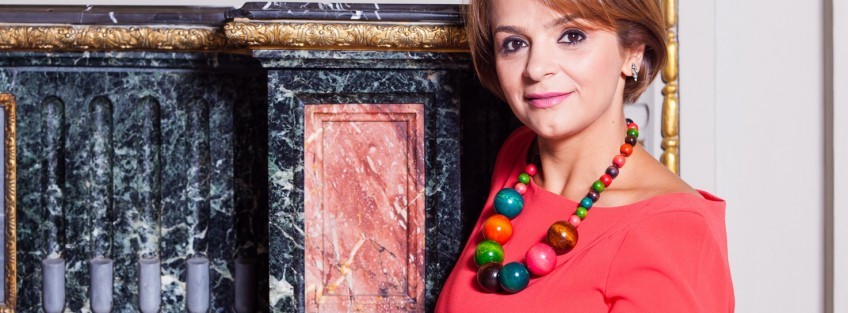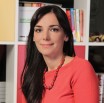Interview with Loredana Van de Waart
Tue | 05.06.2018
Other
1. Dear Loredana, welcome to the NRCC Board! Firstly, please introduce yourself briefly.
If I were to define myself briefly using both humanistic and realistic concepts, I would say that I am the sum of four – being a woman, a mother, a wife and a lawyer –and my objective is that these four are perfectly balanced, objective so difficult to attend in our days! In my life I strive to apply the most important advice I have received from my mother: never give up on “myself” as a combination of two factors: my career, because it is a part of me and of what I am today, and my family, because it gives me the energy and the strength to move on.
I am the mother of two wonderful girls, aged 11 and 7, who fill me with energy and vitality. Together with my husband, who is a Dutch citizen, we decided to stay in Romania to raise our children and develop our careers –him in agriculture and me in law.
I am a business lawyer, Partner in the GRUIA DUFAUT Law Office, where I have been coordinating for several years the Consultancy Department. This position has allowed me to successfully manage a large number of legal projects carried out in Romania by foreign investors, in various sectors. Particular areas of my specialization are M&A, public procurement & PPPs, real estate law and competition law.
2. You are a Law graduate and you have also followed various certifications abroad from Paris to Washington and Rome. How did your studies abroad helped you become a leading women in the Business you are representing at this moment?
After I completed my university studies and after I became a member of the Bucharest Bar Association, in 2000, I decided to pursue a career in business law, because during my university studies business law disciplines were the most interesting and challenging for me. It is quite possible that this leaning towards the "economic" disciplines of law is also due to my realistic side, as in high school I was more inclined towards mathematics and physics.
Or, being a business lawyer specialized in international law also requires knowledge of the principles and organization of other legal systems, especially those in which clients are constantly operating.
I have attended several training courses in the US (in US law), France (French law) and Italy (private international law), and at the Academy of European Law (European Law). Both the theoretical knowledge (principles/institutions), but especially the practical knowledge of other much different law systems (such as the American system) or closely related systems (such as the French and European systems), helped me consolidate my career in law. It also helped me to better understand what clients want and to offer them practical legal solutions, as close to their objectives as possible.
I believe that my passion for this profession, combined with the logic and rigor of my realistic side have been my strengths in my professional growth. When analysing each case, I start from the principle that nothing is impossible and I try to find solutions, to innovate, to import from other systems and to adapt them to our law (still poorly developed in many areas), to be the Client’s partner and not just a simple service provider. Then, the fact that I started working in a "human" medium-sized law office allowed me to acquire extensive knowledge in different areas of law, to practice, to exercise, to understand. I took advantage of all the flexibility offered by a medium-sized law office to grow in various areas and have a global understanding of the legal issues of a business. The environment in which you work is also particularly important, as it is an incentive for performance.
3. How did you find out about NRCC and what determined you to apply for a seat as a Board Member?
I have known about NRCC since the beginning, both due to my personal relationship with the Dutch community in Romania and to due to business relations, as our Law Office has Dutch clients as well. I have witnessed the development of this Chamber into one of the most dynamic chambers of commerce in Romania. I applied for a seat in the Board because I wanted to get more actively involved in the development of this Chamber and of the Dutch Romanian community. I wish to support this Chamber and its members, especially through advocating and through sharing my expertise in the legal field. Together with the other Board Members, I want us all to help the Dutch community in sharing the Dutch experience- especially in terms of innovation and education - with the Romanian authorities and business community.
4. Regarding legal challenges for Romanian business, especially SMEs, could you describe the top 5, in your opinion, and what would you recommend for them to avoid those challenges?
If I were to draw up a top 5 of the legal challenges Romanian business is facing (both large corporations and SMEs), it would be: (1) the lack of predictability and the legislative instability – in a normal market, any investment/business is based on certain data in a certain period of time, but if this data changes very often, without prior information and without a transitory period (as it often happens in Romania), those changes intended to help the business environment will turn against it; (2) the exaggerated bureaucracy, caused, on one hand, by the complicated legislation regarding the authorization of a business; (3) a poor management of public projects and investments, so necessary for the business environment - this point is less related to legislative issues than to the poor capacity to generate public projects; (4) poor education in the economic and technical field, an education that should be in line with the business needs - the legislative reform in the field of education leaves much to be desired in relation to today's needs, as well as the future of the market and (5) the lack of a flexible legislation, less sanctioning and with a more constructive approach.
As regards the SME, we have to bear in mind that in the Romanian economic environment we have two types of SMEs: the traditional ones, whose actions and development rather depend on the talent and courage of their founders, which have a rather small size and a shorter lifecycle, and modern SMEs that use cutting-edge technologies, always looking for new markets. However, trying to generalize, we notice that both types of SMEs are under the influence of environmental factors, which are generally unstable and present numerous constraints.
Faced with these complex challenges, SMEs are "condemned" to innovation, the development of new products/concepts/services and to adopt development strategies that can be easily adapted/changed. One of the main strength of SMEs is their flexibility in making decisions. In SME development, Romania should learn a lot from the Netherlands, where SMEs are the main motor of the economy.
5. Was 2017 a good year for Gruia Dufaut Law Office and what would be the future development plans for your company?
Although it was a year marked by many legislative changes, some more controversial than others and hard to understand, 2017 was a successful year for the GRUIA DUFAUT Law Office.
We have represented important companies either in transactions involving the sale/acquisition of assets and shares, or in the reorganization or establishment of companies in Romania. Besides mergers and acquisitions, where we continued to be active, we also noticed a re-launch of areas such as real estate, especially the industrial real estate sector. The upward trend recorded for several years has been maintained and the projects we are working on now give us reasons to be optimistic. Unfortunately, the political environment and the latest legislative changes in the economic area worry us ..
As far as our future plans are concerned, they are primarily related to the consolidation of the team and the constant improvement of the services we provide to our clients. I think that the GRUIA DUFAUT team and the expertise they have accumulated during the years as well as our focus on finding innovative solutions for our clients' projects are what differentiate us in the market. The fact that over 80% of our lawyers have more than 10 years of experience in business law is a significant thing. Multilingualism is another one of our assets, because it allows us to talk to our clients, to get to know them and to interact better with them.
6. If you were to describe NRCC in one sentence, what would it be?
NRCC is the most active local association, which promotes and advocates for the community, for economic prosperity and for business interests.
7. As a final note, please send a message to our members.
As a Board Member, I want to NRCC to focus on five objectives for the benefit of its members: building communities attractive to residents and investors; advocating for those communities and the main issues they encounter with the public authorities and partners, striving to ensure future prosperity via a pro-business climate, representing the unified voice of the Dutch-Romanian community and sharing Dutch business models and practices with the network and with the Romanian authorities and business community.
2025
-
November (1)
-
October (1)
-
September (1)
-
July (1)
-
June (1)
-
April (1)
-
February (2)
-
January (1)
2024
-
November (1)
-
October (1)
-
July (1)
-
May (1)
-
March (1)
-
February (1)
-
January (1)
2023
-
November (1)
-
September (2)
-
August (2)
-
June (1)
-
May (1)
-
April (2)
-
March (1)
-
February (2)
-
January (2)
2022
-
December (3)
-
November (4)
-
October (3)
-
September (4)
-
August (3)
-
July (6)
-
June (4)
-
May (4)
-
April (8)
- Marketing News by diARK - April 2022
- Finance News by Mazars Romania - April 2022
- Experience the Perfect Chauffeur Transfer with David Intercar
- Mobility News by Business Lease - April 2022
- NRCC MEMBER IN SPOTLIGHT, WOLTERS KLUWER
- Crowe Romania and DeclaratiaUnica.ro engage in the automation of the single return form and the offering of personalized consultancy
- Cryptocurrency News by Bitcoin Romania, April 2022
- Legal News by BBW LAW - April 2022
-
March (6)
-
February (4)
-
January (5)
2021
-
December (3)
-
November (4)
-
October (2)
-
September (2)
-
August (1)
-
July (5)
-
June (3)
-
May (5)
-
April (4)
-
March (7)
- Cryptocurrency News by Bitcoin Romania, April 2021
- HR News by CNA International Executive Search Romania, March
- Real Estate News by CTP Invest, March 2021
- Sale-Purchase of Agricultural Land Located Outside Build-Up Areas
- MEET THE NRCC BOARD CANDIDATES 2021
- Fleet Management – Complete Makeover or Small Adjustments?
- Cryptocurrency News by Bitcoin Romania, March 2021
-
February (5)
-
January (6)
2020
-
December (2)
-
October (2)
-
September (3)
-
August (2)
-
July (6)
- NRCC Member in Spotlight Interview - Autonom
- Insolvency Proceedings: New Rules
- Member in Spotlight, UniCredit Bank
- Financing opportunities overview for large enterprises, SMEs and other organizations
- Companies: Simplification of Formalities
- Call for Leaders | What is your readiness score to benefit from the EU SURE initiative?
-
June (5)
-
May (8)
- The State of Alert. New rules for the collective proceedings
- The Retail Industry
- EU grants up to 6 Mil Euro for SME-s investment projects
- Member in spotlight, Heisterkamp Transportation Solutions
- State of Alert...What Is New
- The forced transformation of the automotive industry – Mazars analysis
- State of Alert in Romania
- Reducing the Impact of the Pandemic
-
April (6)
-
March (2)
2019
-
November (2)
-
July (1)
-
June (1)
-
March (2)
-
January (1)
2018
-
October (2)
-
September (1)
-
August (1)
-
July (3)
-
June (2)
-
May (1)
-
April (1)
-
March (3)
-
February (13)
- NRCC Elections 2018 - Elena Badea
- NRCC Elections 2018 - Loreda Dragomir
- NRCC Elections 2018 - Simina Fodor
- NRCC Elections 2018 - Manuel Herraiz Orti
- NRCC Elections 2018 - Tom Leene
- NRCC Elections 2018 - Mircea Moga
- NRCC Elections 2018 - Ronald Oort
- NRCC Elections 2018 - Razvan Pascu
- NRCC Elections 2018 - Alexandru Popescu
- NRCC Elections 2018 - Mihaela Tudor
- NRCC Elections 2018 - Loredana Van de Waart
- NRCC Elections 2018 - Edwin Warmerdam
- NRCC Elections 2018 - Philip Aarsman
2017
-
November (1)
-
September (1)
-
August (2)
-
May (1)
-
April (2)
-
March (1)
2016
-
November (1)
-
September (8)
-
June (1)
-
February (2)








